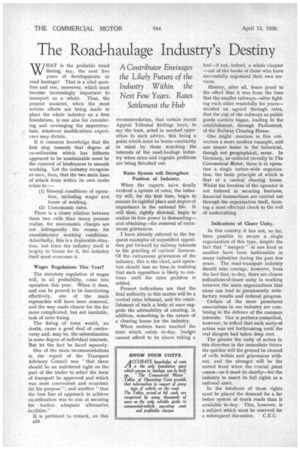The Road-haulage Industry's Destiny
Page 48

If you've noticed an error in this article please click here to report it so we can fix it.
WHAT is the probable trend during, say, the next five years of developments in road haulage? That is a vital question and one, moreover, which must become increasingly important to transport as a whole. Thus, the present moment, when the most serious efforts are being made to place the whole industry on a firm foundation, is one also for considering and envisaging the superstructure, whatever modifications experience may dictate.
It is common knowledge that the first step towards that degree of co-ordination which has hitherto appeared to be unattainable must be the removal of hindrances to smooth working. Let the industry recognize at once, then, that the two main lines of attack from within its own ranks relate to : (1) General conditions of operation, including wages and hours of working.
(2) Uneconomic rates.
There is a closer relation between these two evils than many persons realize, for uneconomic charges are not infrequently the reason for unsatisfactory working conditions. Admittedly, this is a deplorable situation, but since the industry itself is largely to blame for it, the industry itself must overcome it.
Wages Regulations This Year?
The statutory regulation of wages will, in all probability, come into operation this year. When it does, and can he proved to be functioning effectively, one of the main reproaches will have been removed, and the way made clearer for the far more complicated, but not insoluble, task of rates fixing.
The fixing of rates would, no doubt, cause a good deal of controversy and, may be, the subordination in some degree of individual interests. But let the fact be faced squarely.
One of the main recommendations in the report of the Transport• Advisory Council was "that there should be an unfettered right on the part of the trader to select the form of transport he approved and which was most convenient and economic • for his purpose "; and another "that the best line of approach to achieve co-ordination was to aim at securing for traders adequate alternative facilities,"
It is pertinent to remark, on this B38
recommendation, that certain recent Appeal Tribunal findings have, to say the least, acted in marked opposition to such advice, this being a point which must be borne constantly in mind by those watching the interests of the road-haulage industry when rates and cognate problems are being thrashed out.
Rates System will Strengthen Position of Industry.
When the experts hive finally evolved a system of rates, the industry will, for the first time, begin to assume its rightful Place and degree of importance in the national life. It will then, rightly directed, begin to realize its true power in demanding— and obtaining—the removal of extraneous grievances.
I have already referred to the frequent examples of unjustified opposition put forward by railway interests to the granting of carriers' licences. Of the extraneous grievances of the industry, this is the chief, and operators should lose no time in realizing that such opposition is likely to continue until the rates problem is settled.
Present indications are that the final authority in this matter will be a central rates tribunal, and the establishment of such a body at once suggests the advisability of creating, in a.cklition, something in the nature of a clearing house for the industry.
When matters have reached the state which exists to-day, leaders cannot afford to be above taking a leaf—if not, indeed, a whole chapter —out of the books of those who have successfully organized their own services.
History, after all, bears proof to the effect that it was from the time
that the smaller railways after fighting each other wastefully for years— decided on agreed through rates, that the rise of the railways as public goods carriers began, leading to the establishment, through Parliament, Of the Railway Clearing House.
One might mention in this connection a more modern example, and one nearer home in the industrial, though not geographical, sense. In Germany, as outlined recently in The Commercial Motor, there is in operation a single nation-wide organization, the basic principle of which is that of a central clearing house. Whilst the freedom of the operator is not fettered in securing business, financial transactions are carried out through the organization itself, forming a most effectual check to the evil of undercutting.
Indications of Closer Unity.
In this country it has not, so far, been possible to secure a single organization of this type, despite the fact that " mergers " of one kind or another have been fashionable in many industries during the past few years. The road-transport industry should take courage, however, from the fact that, to-day, there are clearer indications of closer unity in working between the main organizations that alone can lead to permanently satisfactory results and ordered progress.
Certain of the more prominent associations in our industry are combining in the defence of the common interests. One is perforce compelled, however, to reflect that such unity-of action was not forthcoming until the real dangers had taken deep root.
The greater the unity of action in this direction in the immediate future the quicker will the grolind be cleared of evils within and grievances without, and the stronger will be the united front when the crucial point comes—as it must do shortly—for the industry to assert its full rights as a national asset.
In the forefront of those rights must be placed the demand for a far better system of trunk roads than is available to-day. This, however, is a subject which must be reserved for a subsequent discussion. C.E.C.




















































































